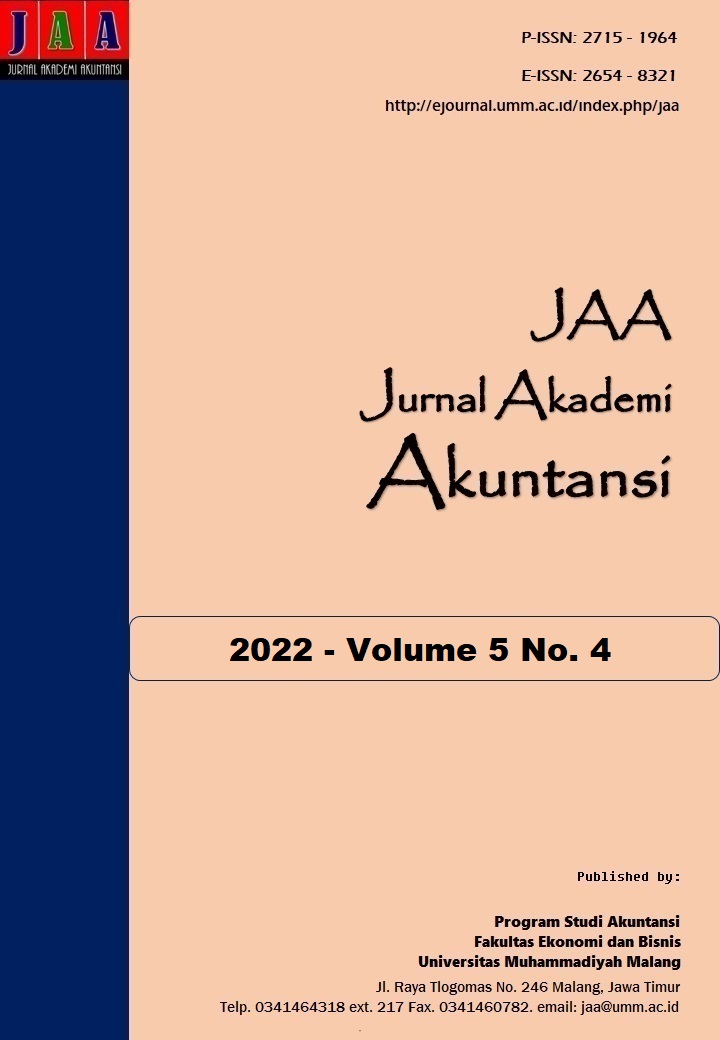Mengintegrasikan Etika Islam Dalam Dilema Etis Dan Pendidikan Akuntansi
DOI:
https://doi.org/10.22219/jaa.v5i4.22345Keywords:
Accounting Education, Code of Ethics, Ethical Dilemas, Islamic EthicsAbstract
This study aims to integrate Islamic ethics in ethical dilemmas and accounting education in order to help accountants to behave ethically based on Islamic guidelines and eventually decrease the desire to behave fraudulently and monopolize financial statements. This study utilizes a qualitative research by applying literature study methods according to the library research method book. This study uses data, which is articles related to the topics discussed taken from accounting journals. The results of the study show that there is a need to reform the current accounting rules to harmonize the ethical thinking of accountants. Furthermore, the integration of Islamic ethics in ethical dilemmas and accounting education is crucial, so that accounting students in University become more aware of ethical behavior. Finally, the integrity of Islamic ethics as outlined in professional education and training programs is able to instill a good ethical mentality from the accountants, so as to provide them in facing ethical dilemmas.
Downloads
References
Ahmad, M. G., & Syed, J. (2021). Meta-Characteristics of Islamic Ethics and Moral Consistency in Islamic Banking. Business and Society, 60(8), 2026–2059. https://doi.org/10.1177/0007650320928470
Ahmad, N. L., & Ahmed, H. (2017). The Acceptability and Impact of Sharia Foundation of Islamic Ethics in Accounting Education. 7(2), 494–506. https://doi.org/10.6007/IJARBSS/v7-i2/2659
Beekun, R. I., & Badawi, J. A. (2005). Balancing ethical responsibility among multiple organizational stakeholders: The Islamic perspective. Journal of Business Ethics, 60(2), 131–145. https://doi.org/10.1007/s10551-004-8204-5
Dunn, P., & Sainty, B. (2020). Professionalism in accounting : a fi ve-factor model of ethical decision-making. 16(2), 255–269. https://doi.org/10.1108/SRJ-11-2017-0240
Keller, A. C., Smith, K. T., & Smith, L. M. (2007). Do gender, educational level, religiosity, and work experience affect the ethical decision-making of U.S. accountants? Critical Perspectives on Accounting, 18(3), 299–314. https://doi.org/10.1016/j.cpa.2006.01.006
Lela, N., Yusof, R., Salmuni, W., Wahid, A., & Halim, A. (2019). Developing Ethical Accounting Students through Incorporating Islamic Ethics into Accounting Curriculum : The Educator ’ s Perspectives. February. https://doi.org/10.6007/IJARBSS/v9-i1/5395
Low, M., Davey, H., & Hooper, K. (2008). Accounting scandals, ethical dilemmas and educational challenges. Critical Perspectives on Accounting, 19(2), 222–254. https://doi.org/10.1016/j.cpa.2006.05.010
Mahdavikhou, M., & Khotanlou, M. (2012). New Approach to Teaching of Ethics in Accounting “Introducing Islamic Ethics into Accounting Education.” Procedia - Social and Behavioral Sciences, 46, 1318–1322. https://doi.org/10.1016/j.sbspro.2012.05.294
Mohammad, J., & Quoquab, F. (2016). Furthering the thought of Islamic work ethic : How does it differ ? Journal of Islamic Marketing Article information : July 2016. https://doi.org/10.1108/JIMA-07-2014-0047
Murphy, M. J., & Smolarski, J. M. (2020). Religion and CSR : An Islamic “ Political ” Model of Corporate Governance. https://doi.org/10.1177/0007650317749222
Muslichah, M. (2022). Enhancing Ethical Sensitivity and Decision Making Through Accounting Ethics Education Based on Islam. Journal of Accounting, Business and Management (JABM), 29(1), 24. https://doi.org/10.31966/jabminternational.v29i1.758
Salin, A. S. A. P., Ab Manan, S. K., Kamaluddin, N., & Nawawi, A. (2017). The role of islamic ethics to prevent corporate fraud. International Journal of Business and Society, 18(S1), 113–128.
Young, J. J., & Annisette, M. (2009). Cultivating imagination: Ethics, education and literature. Critical Perspectives on Accounting, 20(1), 93–109. https://doi.org/10.1016/j.cpa.2007.03.003
Yunanda, R. A., & Bt. Abd. Majid, N. (2011). The Contribution of Islamic Ethics Towards Ethical Accounting Practices. Issues In Social And Environmental Accounting, 5(2), 124. https://doi.org/10.22164/isea.v5i2.56
Downloads
Published
Issue
Section
License
Copyright (c) 2023 Elsa Amalia, Laksita Sela Srimaya

This work is licensed under a Creative Commons Attribution-NonCommercial-ShareAlike 4.0 International License.
Jurnal Akademi Akuntansi is licensed under a Creative Commons Attribution-NonCommercial-ShareAlike 4.0 International License.
Authors who publish with this journal agree to the following terms:
- Authors retain copyright and grant the journal right of first publication with the work simultaneously licensed under a Creative Commons Attribution-NonCommercial-ShareAlike 4.0 International License that allows others to share the work with an acknowledgment of the work's authorship and initial publication in this journal.
- Authors are able to enter into separate, additional contractual arrangements for the non-exclusive distribution of the journal's published version of the work (e.g., post it to an institutional repository or publish it in a book), with an acknowledgment of its initial publication in this journal.
- Authors are permitted and encouraged to post their work online (e.g., in institutional repositories or on their website) prior to and during the submission process, as it can lead to productive exchanges, as well as earlier and greater citation of published work (See The Effect of Open Access).
Jurnal Akademi Akuntansi dilisensikan di bawah lisensi Creative Commons Attribution-NonCommercial-ShareAlike 4.0 International.
Penulis yang menerbitkan artikel di jurnal ini menyetujui ketentuan berikut:
- Penulis mempertahankan hak cipta dan memberikan hak jurnal atas publikasi pertama dengan karya yang secara serentak dilisensikan di bawah Lisensi Pengaitan Creative Commons yang memungkinkan orang lain untuk berbagi karya dengan pengakuan atas karya penulis dan publikasi awal dalam jurnal ini.
- Penulis dapat masuk ke dalam pengaturan kontrak tambahan yang terpisah untuk distribusi non-eksklusif versi karya jurnal yang diterbitkan (misalnya, mempostingnya ke repositori institusional atau mempublikasikannya dalam sebuah buku), dengan pengakuan publikasi awalnya di jurnal ini.
- Penulis diizinkan dan didorong untuk memposting pekerjaan mereka secara online (misalnya, di repositori institusional atau di situs web mereka) sebelum dan selama proses pengajuan, karena dapat mengarah pada pertukaran produktif, serta kutipan pekerjaan sebelumnya dan yang lebih besar (Lihat Pengaruh Akses Terbuka).
























